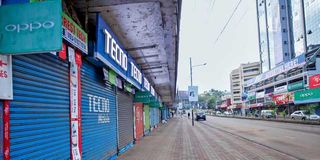Kisumu CBD’s nightlife takes a hit as businesses pushed to outskirts

Businesses in the Kisumu CBD remain closed at 7 am on November 23, 2022. Many businesses in the CBD close by 8 pm and open well past 7 am.
Kisumu is one of Kenya’s only four cities. One would therefore expect it to be busy 24hrs a day. But that is not the case.
Visitors who have been to the city in the past few months have found it rather strange. Apart from the four or five-star hotels within the city centre, they have struggled to get a restaurant where they can have a proper meal after 8.30 pm. Getting an M-Pesa shop to withdraw or deposit cash, a chemist to buy drugs or a public service vehicle is equally a nightmare.
It is around 8.30 pm, and businesswoman Evelyn Atieno wants to withdraw Sh5,000 from an M-Pesa agent to pay her three employees. But she cannot find any open on Oginga Odinga Street, which is Kisumu’s main street.
This “peculiar habit” of the lakeside city sleeping early and waking up late got many Kenyans talking on various social media platforms last week.
Ms Lucianne Limo, who visited Kisumu recently, was surprised by this phenomenon.
Most businesses that operate overnight are nightclubs, which offer opportunities for taxis, boda boda riders and those involved in selling snacks to revellers.
Towns expansion
Acting City Manager Abala Wanga believes that the situation gives satellite towns an opportunity to expand.
“Kisumu is expanding and the CBD is ok with the quiet and serene environment for the hotels there. We have a major plan that will see the likes of Kondele continue to thrive as 24-hour-economies,” said Mr Wanga.
He told the Nation that the move to relocate the bus termini to Patel flats and Uhuru Business Park was also to decongest the city further.
Mr Nelson Odire, a motorcycle operator, says their transport business is one of the worst hit by the lack of nighttime activities in the CBD.
“The fact that by 8 pm there are very few people in town is killing our business. We no longer have customers to take home or deliveries to make around town,” said Mr Odire. He asked the county government to strike a balance and develop both the city centre and the estates.
“You cannot expand the town by killing the CBD. Most businesses cannot survive in the estates because of insecurity. You cannot start selling phones and laptops in the estates,” said Mr Odire.
Mr Richard Ogendo, a former Kisumu County Executive Committee member for economic planning, attributes the slow night business to the relocation of many small businesses from the CBD to the city’s outskirts.
For more than three years, the Kisumu City management has been working hard to spruce up the city. This, however, has come with business casualties, including those who were selling wares on the pavements and those selling second-hand clothes.
“From Kondele towards Kibos many shops are open by 6 am. People moved out of the CBD because we prefer a clean city to a busy one. There has to be a better way of keeping it both clean and busy. Something is definitely scaring traders instead of attracting them,” said Mr Ogendo.
His sentiments are shared by Mr Joshua Nyamori, an advocate, activist and resident of Kisumu
“Scattering of the informal sector is to blame for the dormant nature of Kisumu CBD. The traders used to interact with the formal sector, from which they would buy goods, but this has changed because they have had to look for shops outside of the town centre,” said Mr Nyamori.
Suppliers' debts
He also blamed the low cash flow in Kisumu on the failure of the county government to pay contractors and suppliers in time.
According to Mr Israel Agina, the Kenya National Chamber of Commerce and Industry Kisumu branch chairman, the inactivity in the city centre is because people can now access most goods and services in the estates.
“Many people have now found alternative areas to get what used to be within the town centre. They now have no reason to stay late or wake up early to rush to town to get them, thus fewer people in town,” said Mr Agina.
He also cites the high rent being charged by property owners in town as one of the reasons driving traders and entrepreneurs to the estates or other towns.
“Rent for the business premises within the town has really shot up. You cannot make enough profits with this. Coupled with fewer customers, you just have to look for other options to survive and thus relocate out of town,” said Mr Agina, who is also the Chairman of the Kisumu Business Coalition.
While a 24-hour economy remains elusive within the CBD, Kondele, Mamboleo, Mamba and Nyamasaria areas are doing very well when it comes to nighttime business activity.
Though Kondele has mostly been associated with political violence, it has a vibrant nightlife. It has many businesses operating late into the night, including nightclubs, restaurants and transport.
The popular centre hosts more than four major supermarkets, about nine renowned nightclubs and hotels with good accommodation among others, serving most of the needs of both residents and visitors.
Unfortunately, it has also suffered insecurity, owing to the many jobless youths that hang around the centre who snatch phones and sell drugs.





